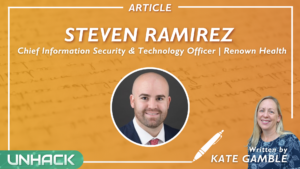




July 24, 2025
The Trump administration's newly unveiled "AI action plan" focuses on enhancing cybersecurity measures against emerging threats associated with artificial intelligence. The initiative aims to support critical infrastructure operators in protecting their AI systems from potential adversarial attacks as AI integration increases. Key aspects include the establishment of an information sharing and analysis center (ISAC) dedicated to AI and a directive for the Department of Homeland Security to create guidance on mitigating AI vulnerabilities. This action plan underscores the urgency for healthcare professionals and other sectors to adapt their security protocols in response to the evolving risk landscape posed by advanced AI technologies.
Trump Administration Unveils AI Action Plan to Boost Cybersecurity Safety Cybersecurity Dive
July 24, 2025
The article highlights the transformative role of Chief Information Security Officers (CISOs) who adopt an outlier mindset, moving beyond conventional risk management to become drivers of innovation and business growth. By viewing security not as a barrier but as an enabler, these leaders enhance organizational trust and agility, allowing businesses to innovate confidently while managing risks effectively. They focus on the critical intersections of systems and teams, identifying vulnerabilities often overlooked, thereby reinforcing security as a strategic asset. This approach is essential for healthcare professionals seeking to integrate robust security measures that support technological advancement without stifling progress.
Outlier CISOs Drive Innovation by Redefining Security as Business Accelerators CIO
July 24, 2025
Data from cybersecurity sensors monitoring critical infrastructure is currently unanalyzed due to an expired government contract, raising concerns over vulnerabilities in operational technology (OT). During a recent House Homeland Security hearing, Lawrence Livermore National Laboratory's program manager emphasized the necessity of the CyberSentry program for detecting hidden threats, underscoring its integration of research with practical application. Although confirmed as operational by CISA, the lack of government funding has severely restricted the analysis of threat data, potentially compromising national security. This situation highlights the critical need for timely funding and support for cybersecurity initiatives in healthcare and other essential sectors.
Critical Infrastructure Threats Unmonitored Due to Lapsed Cybersecurity Contract Cyberscoop
July 23, 2025
Since the rollout of the Federal EHR system at Captain James A. Lovell Federal Health Care Center in March 2024, there has been a remarkable 75 percent increase in lung cancer screenings among Veterans. The growth is largely due to the Comprehensive Adult Wellness Registry, which helps coordinators identify high-risk patients based on their tobacco use history and other EHR data, thus enhancing population health management. This proactive engagement strategy improves patient outcomes by automating the identification of eligible individuals, streamlining coordination of care, and ensuring timely follow-up on screening results. As healthcare technology continues to evolve, such systems highlight the importance of integrating data-driven approaches to enhance early detection and treatment of serious conditions like lung cancer.
New Federal EHR Boosts Lung Cancer Screenings for Veterans by 75% VA News

April 2, 2025

March 28, 2025


© Copyright 2024 Health Lyrics All rights reserved